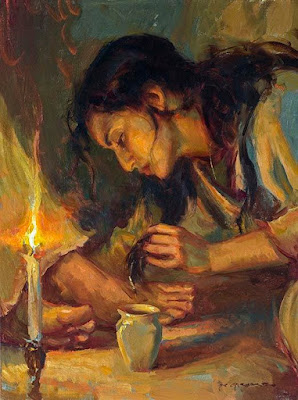Readings: Isa 42:1-7; Ps 27:1-3; John 12:1-11
Our first reading this evening is the first of what Bible scholars have dubbed Deutero-Isaiah’s Servant Songs. For those who don’t know, the Book of Isaiah is really three books in one. First, or Proto-Isaiah, written before Israel’s Babylonian Exile, consists of the first thirty-nine chapters of the book. Second, or Deutero-Isaiah, which includes chapters 40-55, was composed during the Babylonian exile (seventh century BC). Third, or Trito-Isaiah was written after Israel’s return from exile.
Our Old Testament reading for Passion Sunday was also one of Deutero-Isaiah’s Servant Songs. Our first reading for tomorrow and for Wednesday of Holy Week are also taken from these Servant Songs. These passages from are so important because, as Christians, we see in them prophesies about Jesus Christ. Without a doubt, the inspired authors of the canonical Gospels were well aware of these prophesies and made use of them, seeking parallels between them and the life, passion, and death of Jesus.
Our first reading this evening surely speaks of what Israel’s eagerly-awaited Messiah would do: open the eyes of the blind, free prisoners (the Israelites themselves, in context, are prisoners), and bring those who live in darkness into the light.
By anointing Jesus, whom she clearly sees as Messiah (Messiah means “Anointed One”), with costly oil, Mary, the sister of Martha and Lazarus, Jesus’ friends from Bethany, pays him proper homage. By this act she not only recognizes him as Messiah, but as Jesus himself indicates in his response to Judas’ rebuke, she anticipates his sacrificial death.
Jesus receives the anointing of his friend Mary without protestation. He defends her, telling Judas, “Leave her alone.” Jesus’ prediction of his death is confirmed when the inspired author notes that the chief priests, who were gathered with the crowd, desired to kill not only him but his friend Lazarus, whom he had raised from the dead. It was the man who was dead and now alive the crowd came to see. This miracle, according to John, was causing many others to believe in Jesus. This posed a threat.
Holy Week is a time for us, like Mary of Bethany, to recognize Jesus not only as Messiah but as Lord of all. His Lordship, as the Servant Song we heard notes at its beginning, is not loud, brash, or assertive, like those who seek worldly power. Rather, the servant of God, his chosen one, “shall bring forth justice to the nations” quietly in a manner barely detected, if noticed at all by many.
Unlike Mary, who, it seems, is the silent, contemplative one in her family, the one who Luke tells us sat at Jesus’ feet on an earlier visit, while her sister complained about her not helping out. On that occasion, Jesus gently reminded Martha that only one thing is necessary: to be with him. He tells her that by sitting at his feet, her sister had chosen the better part. Mary chose to do the one thing necessary. (see Luke 10:38-42). In other words, the response to Jesus' coming is not "look busy!"
During these holy days, let’s you and I chose the better part. Being here this evening is a good start.
Blogito ergo sum! Actually, as N.T. Wright averred, "'Amor, ergo sum:' I am loved, therefore I am." Among other things, I am a Roman Catholic deacon. This is a public cyberspace in which I seek to foster Christian discipleship in the late modern milieu in the diakonia of koinonia and in the recognition that "the Eucharist is the only place of resistance to annihilation of the human subject."
Subscribe to:
Post Comments (Atom)
Memorial of Saint Timothy and Titus, Bishops
Readings: Titus 1:1-5; Psalm 96:1-3.7-8.10; Mark 3:22-30 . . . Timothy, Timothy, Titus, and Philemon/ To the Hebrews/ The Epistle of Ja...

-
To the left is a picture of your scribe baptizing last Easter. It is such a privilege to serve God's holy people, especially in the cel...
-
Because my parish celebrated Mass in the evening instead of in the morning today, I was able to assist my pastor at the altar on this Memori...
-
In a letter to his congregation at New-Life Church in Colorado Springs, removed Senior Pastor Ted Haggard implored the congregation to forgi...


No comments:
Post a Comment